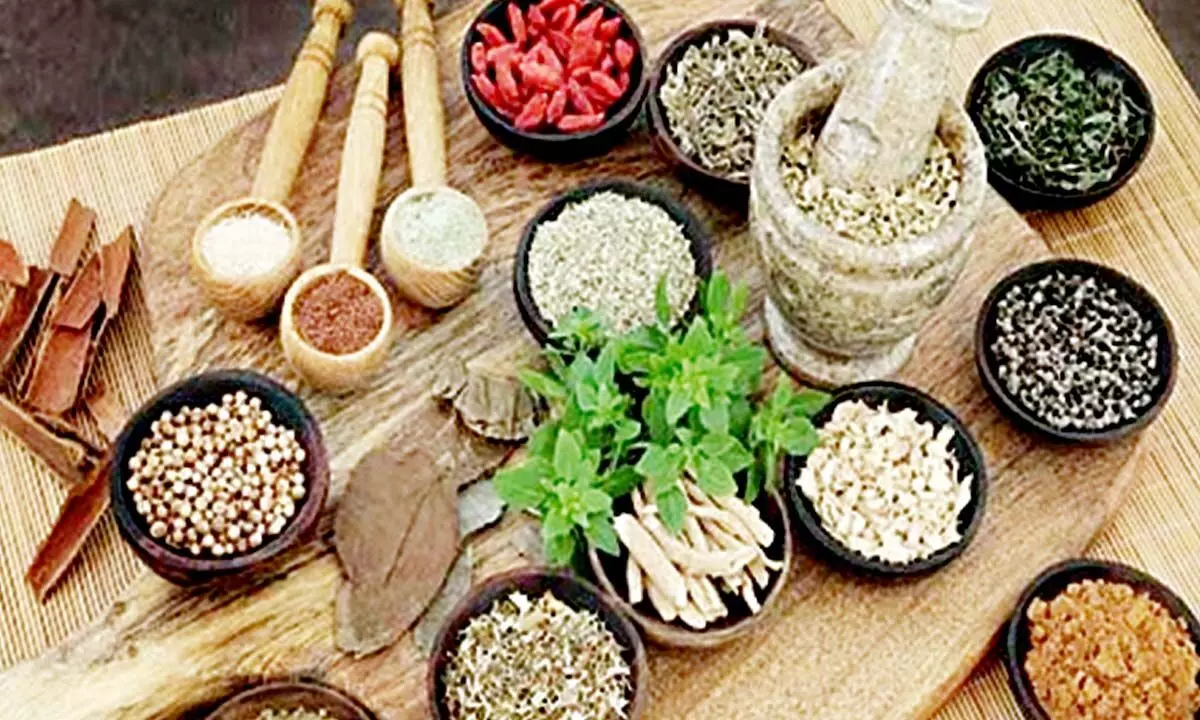Establishing separate HS Code & AEPC to boost Ayush exports
By establishing a separate ITC-HS Code, Ayush ministry aims to set up codes of practices as the general guidance of manufacturers for trade and export
image for illustrative purpose

The Ayush Export Promotion Council (AEPC) will monitor exports of Ayush drugs and even services of the Ayush systems. The government's initiatives, which will definitely give a boost to the Ayush exporters, follows the emerging opportunities in Ayush products as there is a growing interest across the world in Ayush-based solutions for disease resistance and treatment for the Covid-19
In what can prove to be a big boost to the export of Ayurveda, Homoeopathic, Siddha, Sowa Rigpa and Unani (Ayush) products and services, the Union Ministry of Ayush has decided to establish a separate Indian Trade Classification-Harmonised System Code (ITC-HS Code) for these products. Besides, the ministry will also create new tariff lines under the Customs Tariff Act, 1975 for the Indian Systems of Medicine (ISM) products and others, as part of promoting Ayush exports.
As part of supporting the export initiatives in the system, the Ministry is working on the ITC-HS codes which are derived from the international HS classification and usually runs up to eight digits. Both the Indian foreign trade statistics and customs data are generated using ITC-HS classification. Most of the products of Ayurveda, Homoeopathic, Siddha, Sowa Rigpa and Unani systems, Herbal Products and Medicinal Plants products are not identified under specific HS codes.
Earlier, the Ayush Ministry had formed a Task Force on Expanding Trade Classification, Quality Control and Standardisation of Indian Systems of Medicine and Herbal Products and the Task Force had submitted a detailed report which recommended the allocation of new HS lines for ISM products, herbal products and medical plants products. Accordingly, the Ministry of Ayush started consultation with Central Board of Indirect Taxes and Customs (CBIC) and constituted a working group for the creation of new Tariff Lines in the Customs Tariff Act, 1975 for ISM products, herbal products and medical plants products.
By establishing a separate ITC-HS Code, the ministry also aims to set up codes of practices as the general guidance of manufacturers for trade and export and to come up with a uniform classification system for Ayush and Herbal products; to develop brand value to the Ayush Medicines and Healthcare Science; to undertake foreign market studies for Ayush; and to liaison with other Ministries and Departments including the Ministry of Commerce, for laying down standards of quality and packing in respect of Ayush medicines and healthcare products. This would work as a single-window system and a dedicated platform under the Ministry of Ayush and Ministry of Commerce to boost the export of Ayush products and services.
In fact, the Ministry of Ayush has been taking various steps for the development and export of Ayush products and services across the world. These include signing 25 country-to-country memorandums of understanding (MoUs) for cooperation in the field of traditional medicine and homoeopathy with foreign nations. Another 37 MoUs have been signed with international institutes for undertaking collaborative research and academic collaboration.
Besides, 15 MoUs have been signed with international institutes for the setting up of Ayush Academic Chairs in foreign nations. The Ministry has provided support for the establishment of 38 Ayush Information Cells in 34 foreign nations. Besides, the Ministry, under its International Fellowship/Scholarship Programme, offers scholarships to foreign nationals for undertaking Ayush courses in recognized Ayush institutions in India.
Earlier in April this year, Prime Minister Narendra Modi had launched the Ayush Export Promotion Council (AEPC) to oversee exports of products of Ayurveda, Homoeopathic, Siddha, Sowa Rigpa and Unani systems and address trade issues pertaining to these alternative medicine sectors. The AEPC, which will have an exclusive focus on the implementation of trade-related initiatives and easing of trade issues in the Ayush sector, is being set up on the lines of Pharmaceuticals Export Promotion Council of India (Pharmexcil), which played a key role in promoting exports of pharmaceutical products. Pharmexcil's role in boosting the pharmaceutical exports from the country is now well known.
The Council was created by the Union Ministry of Ayush in cooperation with the Union Ministry of Commerce and Industry, along with other stakeholders such as the Federation of Indian Chambers of Commerce and Industry (FICCI) and Invest India. The Council will have an exclusive focus on the implementation of trade-related initiatives and easing of trade issues while representing the interest of the Ayush exporters in all interactions with domestic and global stakeholders.
The Council will monitor exports of Ayush drugs and even services of the Ayush systems. The government's initiatives, which will definitely give a boost to the Ayush exporters, follows the emerging opportunities in Ayush products as there is a growing interest across the world in Ayush-based solutions for disease resistance and treatment for the Covid-19. The world now knows that Ayush products played a key role in providing the much-needed immunity to the people to fight against the dreaded disease of Covid-19.
(The author is freelance journalist with varied experience in different fields)

